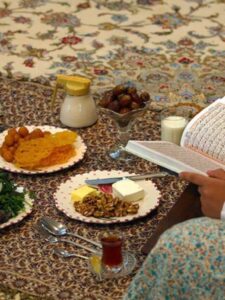Common mistakes to avoid in Ramadan: Ramadan is a holy month in the Islamic calendar, observed by Muslims worldwide with fasting, prayer, and acts of charity. During this month, Muslims abstain from food and drink from dawn until sunset, and dedicate themselves to self-reflection and spiritual growth. However, there are some common mistakes that people make during Ramadan, which can diminish the benefits of this holy month. Here are some of the common mistakes to avoid in Ramadan:
20 Some Common Mistakes to Avoid in Ramadan
1) Overeating during Iftar: one of the most common mistakes to avoid in Ramadan which is also bad for health. It’s common for people to overindulge in food and drink during iftar (the meal eaten after sunset to break the fast). However, this is not only unhealthy, but it also goes against the spirit of Ramadan. Instead, try to eat in moderation, and choose healthy, nourishing foods.
The secret to everything is moderation. The two hadiths below should be acted upon year-round, not just during Ramadan: 
A person who eats too much is sluggish, distracted from performing numerous acts of obedience and devotion, and their hearts become careless.
It was said to Imam Ahmad (ra): “Does a man find any softness and humility in his heart when he is full?” He said, “I do not think so.”
The Prophet (pbuh) said: “The son of Adam does not fill any vessel worse than his stomach; for the son of Adam a few mouthfuls are sufficient to keep his back straight. If you must fill it, then one-third for food, one-third for drink and one-third for air.” ~ Ibn Majah, 4/29/3349
2) Skipping Suhoor: Suhoor is a meal eaten before dawn before the fast begins. Skipping suhoor can make it harder to fast during the day, and can also lead to overeating during Iftar, another common mistake to avoid in Ramadan. Make sure to wake up early enough to eat a nutritious suhoor meal.
The Prophet (pbuh) said: “The thing that differentiates between our fasting and the fasting of the People of the Book (Jews and Christians) is eating suhoor.” ~ Muslim 13/56, Abu Dawud 14/31; Nasai 22/77
And He (pbuh) said: “Eat suhoor for in suhoor there is blessing.” ~ Bukhari and Muslim
3) Neglecting Prayer: Ramadan is a time for spiritual reflection and growth, and prayer is a crucial part of this. However, some people neglect prayer during Ramadan, either because they are too busy or because they are too tired from fasting. Make sure to prioritize prayer during Ramadan, and use this time to strengthen your connection with Allah.

Anyone who doesn’t pray will have their fast unaccepted. This is so because it is kufr to not pray. In fact, unless Allah chooses to have mercy, it’s likely that none of his good works will be acknowledged. Prophet Muhammad (pbuh) said:
Between a man and shirk and kufr there stands his giving up prayer. ~ Muslim
4) Wasting Time: With the shorter working hours and the change in routine during Ramadan, it’s easy to fall into the trap of wasting time. Instead, use this time to engage in acts of charity, read the Quran, or spend time with loved ones.
The holy month of Ramadan is extremely valuable. We should endeavor to devote as much time as we can to worshipping Allah so that we can take full advantage of this bounty since before we realize it, this month of kindness and forgiveness will be over. But some of us spend our days watching TV, movies, or even listening to music, or even worse, playing video games.
A Muslim has no time to squander. The Quran makes it plain that when we are brought back to life (in Qiyamah), it will seem as though we were only here for the evening or the morning. Qur’an 79:46
5) Being Rude or Impatient: Fasting can be challenging, and it’s easy to become irritable or impatient during Ramadan. However, it’s important to remember that this is a time for patience and self-discipline. Make a conscious effort to be kind, patient, and compassionate with those around you, even when you’re feeling tired or hungry. this is a common mistake to avoid in Ramadan you should be aware of.
6) Watching too much TV or Social Media: During Ramadan, it’s important to disconnect from the distractions of the world and focus on spiritual growth. However, some people spend too much time watching TV or scrolling through social media during Ramadan, which can be a waste of time and energy. Try to limit your screen time during Ramadan, and use this time to connect with Allah and with those around you.
7) Excessive Physical Activity: Ramadan requires physical and mental discipline, and it can be tempting to use the extra time for strenuous exercise or activity. However, excessive physical activity can lead to dehydration and fatigue, which can make it harder to focus on spiritual growth. It’s important to strike a balance between physical activity and rest during Ramadan.
8) Not Staying Hydrated:  Fasting can be physically demanding, and it’s crucial to stay hydrated during the non-fasting hours. Make sure to drink plenty of water and other hydrating fluids during iftar and suhoor, and avoid caffeinated or sugary drinks, which can lead to dehydration.
Fasting can be physically demanding, and it’s crucial to stay hydrated during the non-fasting hours. Make sure to drink plenty of water and other hydrating fluids during iftar and suhoor, and avoid caffeinated or sugary drinks, which can lead to dehydration.
9) Oversleeping: With the change in routine during Ramadan, it’s easy to oversleep and miss important prayers or activities. Some people “sleep away their fast” by sleeping the majority of the day away. Is this truly all that is expected of us in this honorable month? These folks are also captives to their desires for ease and comfort and miss the point of fasting. They are unable to ‘handle’ being awake, dealing with a little hunger, or exercising a little restraint. Spending most of the day asleep while fasting is nothing more than carelessness on his part.

Make sure to set a regular sleep schedule during Ramadan, and try to wake up early for suhoor and fajr prayer.
10) Focusing Solely on Personal Worship: Ramadan is a time for communal worship, and it’s important to connect with others during this month. Make an effort to attend Taraweeh prayer at the mosque, participate in community iftars, and engage in acts of charity and service to those in need.

11) Neglecting Self-Care: Fasting can be physically and emotionally challenging, and it’s important to prioritize self-care during Ramadan. Make sure to get enough rest, eat nourishing foods, and take breaks when needed. This will help you to maintain your physical and emotional well-being during this holy month.
12) Not Setting Realistic Goals: Ramadan is a time for self-improvement and growth, but it’s important to set realistic goals and expectations. Make a plan for how you will spend your time during Ramadan, and set achievable goals for spiritual growth and self-improvement.
13) Seeking only the 27th of Ramadan’s night as Laylatul Qadr: Some people neglect all previous odd nights in the final 10 days of Ramadan and only pray on the 27th night to seek Laylatul Qadr.

The night before Eid on the 29th, if the new moon is visible that night, is one of the most virtue-filled nights. Many people are shopping in marketplaces or on the streets. Laylatul Qadr likely falls on the eve of Eid, hence participating in worship activities such as prayer is mustahab.
14) Missing the perfect chance to have your dua accepted: Time just before iftar is the golden time to make Dua as the Shiddat of fasting is at its highest.
The prayer of the fasting person is guaranteed to be accepted at the time of breaking fast. The Prophet (pbuh) said: “Three prayers are not rejected: the prayer of a father, the prayer of a fasting person, and the prayer of a traveler.” ~ Al-Bayhaqi, 3/345
Some individuals miss this wonderful opportunity to make Dua because they are too preoccupied to sit down and do so because they are frying fritters, conversing, setting the table, filling their plates and drinks, etc. Consider whether eating is more essential than receiving a chance of having your sins forgiven or having your Duas fulfilled.
15) Eating food endlessly until the end of maghrib: Some people overindulge when they break their fast and then keep eating, sipping tea, enjoying dessert, etc. till they miss Maghrib prayer. That can’t be right, of course.
According to the Prophet’s (pbuh) Sunnah, after breaking his fast with some dates, he hurried to the Magrib Salah.
You can always go back and eat more when the prayer is finished if you’d like.
16) Delaying in breaking the fast: To be “on the safe side,” some people choose to wait until the adhan has finished or even several minutes after that. However, it is Sunnah to break the fast quickly, which means doing so as soon as adhaan begins, that is, as soon as the sun has fallen. Said Aisha (ra): “This is what the Messenger of Allah (pbuh) used to do.” (Sahih Muslim)
The Prophet (pbuh) said: “The people will continue to prosper so long as they hasten to break the fast.” ~ Bukhari 1957; Muslim 1098
Then, Put faith in Allah and break your fast precisely on time by checking the accuracy of your clock, timetable, etc.
17) Smoking: Islam forbids smoking since it is one of the most evil activities, whether it is done during Ramadan or not. And “smoking material” of ALL types are included in this. Examples include hookahs, cigarettes, cigars, and pipes.
Quran 7:157 says, “He allows them as lawful At Tayyibaat (all good and lawful things), and prohibits them as unlawful Al Khabaa’ith (all evil and unlawful things).”
The others surrounding the smoker who smoke are also harmed by it. Additionally, it is a way to waste money. According to the Prophet (pbuh), “There should be no harming or reciprocating harm.” Ibn Majah 2340. This is particularly true during fasting, and it renders the fast invalid.
Read more about Things that break your fast here.
18) If you don’t give up evil while fasting, your fast is useless: Unaware that the goal of fasting is to practise fear of Allah, some of us fast but do not abstain from lying, cursing, fighting, backbiting, etc., while others fast but do not abstain from cheating, theft, dealing in haram, etc. and other types of forbidden actions.
It should be remembered that all of these actions are prohibited, whether during Ramadan or not. Your fast will be invalidated if you do it, especially during Ramadan. Yes! For instance, if you backbite during Ramadan, your fast is void.
Quran 2:183 says, “O you who believe! Fasting is prescribed for you as it was prescribed for those before you, that you may become pious/righteous.“
The Prophet (pbuh) said: “Whoever does not give up false speech and acting upon it, and ignorance, Allah has no need of him giving up his food and drink.” (Sahih Bukhari 1903, 6057)
Additionally, one must safeguard themselves from the “zina of eyes”. Zina is a term for adultery or fornication. Zina of eyes, then, would entail engaging in prohibited behavior, which in this instance would mean showing interest in non-mahram women. When a man is fasting, his fast is broken if he becomes aroused while staring at a non-mahram woman. Therefore, the Quran orders men to avert their look in order to maintain their chastity. By the way, men should follow this rule all year long, not just during Ramadan.
19) Not observing a fast due to job or a test: For all Muslims, fasting is Fardh (mandatory). Exams or job are not among the justifications for fasting that the Shari’ah permits. If it is too difficult to study and revise during the day, you can do it at night.

Allah says in The Quran 2:286, “Allah does not burden a soul beyond that it can bear.”
Also keep in mind that getting good marks is not nearly as important as pleasing and obeying Allah. In addition, if you observe the fast, even if it means studying, Allah will make it simple for you and assist you in everything you do.
Quran 65 : 2-3 says, “Whosoever fears Allah, He will appoint for him a way out and provide for him from where he does not expect, Allah is Sufficient for whosoever puts his trust in Him.”
20) Organizing and attending lavish iftar parties: Nevertheless, it is a wonderful idea and recommended to invite one another over for iftar. Nonetheless, some people take extravagant “Iftaar parties” to the next level, engaging in all manner of disobedience to Allah, including flirtation, the mingling of opposite genders, hijab-less women, show-off, extravagance, disregard for Salah, Taraweeh, and even music and dance.
In Ramadan, a good deed is multiplied by ten. A bad act committed during Ramadaan is more sinful than one committed at any other time, and similarly, a worshipful act performed during Ramadaan is rewarded by Allah more generously than one performed at any other time.
Conclusion: Avoiding Common Mistakes in Ramadan
In conclusion, Ramadan is a precious opportunity to strengthen our faith, improve our character, and connect with Allah. By acknowledging these common mistakes to avoid in Ramadan and focusing on spiritual growth, we can make the most of this holy month and emerge as better, more compassionate, and more disciplined individuals.
so these were the common mistakes to avoid in Ramadan. If you know more common mistakes to avoid in Ramadan, mention them in the comments below.
Read more Islamic Blogs or Follow us on social media for daily Islamic reminders.






